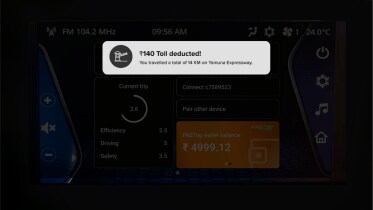By Aprup Shet
Undoubtedly, over the course of the past few years, the government has made significant headways in the overall development trajectory to support and foster India’s electronic toll collection. India is the fourth largest car market in the world and has the potential to become one of the top three in the near future with about 40 crore customers in need of mobility solutions by the year 2030 according to PwC in India.
Today, the country is on track to build a FASTag successor in a GPS-based system which will make toll collection more efficient by allowing vehicle movements across the country to be tracked accurately. Even though the Global Navigation Satellite System and electronic toll collection have been around for decades, the idea of using satellites for road tolling is relatively recent. However, the question remains how India can transform transportation through the GPS-based tolling system and design the future roadmap for a free-flow tolling system in the country based on GNSS technology?
India is building towards a system that is truly capable of transforming transportation in the country through its:
Cost-effective tolling
The advantage of satellite systems for network-wide electronic toll collection systems are evident in terms of their flexibility and very cost-effectiveness for the end user. When a vehicle owner travels across the highway, their vehicle will be charged only for the actual distance it has travelled on the highway stretch. Additionally, there will be reduced waiting time at the toll booths, lesser traffic congestion, and an increase in ease of transaction through real-time digital payment of toll fares via the user’s bank account.
Additionally, an infrastructure overhaul is inevitable with the government planning to eliminate toll plaza booths nationwide within a year.
Improved governance with more data
Satellite-based systems can easily enlarge or reduce charging scheme coverage when needed, ultimately increasing the volume and efficiency of road transport. GPS tolling would undoubtedly make the GST collection more efficient through the constant tracking of vehicles, eliminating the chances of toll GST evasion, and adding to the current revenue collection by the government.
The future is electric. The Indian government pushing for the introduction of more electric vehicles on the road while sales of electric two-wheelers, as well as electric three-wheelers, continue to skyrocket across the country. The central and state government could lose up to 10% of their revenue coming from VAT and excise duty on fuel consumed. GNSS-based distance tax would certainly be an attractive alternative to the fuel tax due to its interoperability. It would absorb fuel tax revenue loss without impeding the EV transition across the country
Impact on climate change
GPS-based toll systems can reduce system emissions as a major contributor to the transport-related emissions that arise from trips generated commonly at intercity corridors. Today, businesses are finding new ways through which they can track and reduce their fleet’s carbon footprint, GNSS will enable India to measure the carbon footprint of the vehicles going around. Furthermore, road authorities can predict changes in traffic conditions and predict measures to coordinate the flow. Fleet traffic can be effectively reduced, with a positive balance for the environment.
The author is Co-Founder, Numadic.
Disclaimer: Views expressed are personal and do not reflect the official position or policy of Financial Express Online. Reproducing this content without permission is prohibited.
